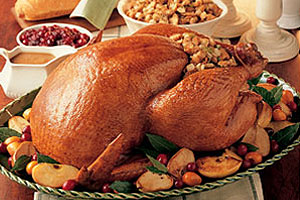 Turkey cannot be the only culprit of induced drowsiness after
Turkey cannot be the only culprit of induced drowsiness after
a Thanksgiving meal.
With the proximity to Thanksgiving, I thought it would be fun to shed some science on the holiday and turkey is a great specimen to study. It is a commonly held assumption that eating copious amounts of turkey, which contain the amino acid Tryptophan, will trigger the drowsiness felt after a large Thanksgiving meal. However, is this assumption true and if so how is Tryptophan the culprit?
Tryptophan is an essential amino acid. An essential amino acid is one that our bodies cannot synthesize, so it must come from food or supplements. Tryptophan is not only a building block in protein biosynthesis in our body but also a biochemical precursor for synthesizing Serotonin, Melatonin and Niacin. Both Serotonin and Melatonin are factors in inducing drowsiness and sleep. Serotonin is a neurotransmitter that facilitates emotions including desire, body temperature, sleep, appetite and metabolism. Serotonin can also be converted into Melatonin, which further regulates sleep, maintaining the circadian rhythms of several biological functions.
The foods that contain Tryptophan are usually protein-based and include chocolate, oats, milk, yogurt, cottage cheese, red meat, poultry, fish, eggs, along with specific nuts and certain fruits. However, turkey contains the same amount of Tryptophan of other meats. Most meats contain .25 grams of Tryptophan per 100 grams of food while dried egg whites contain 1 gram of Tryptophan per 100 grams of food. Turkey cannot be the only culprit of induced drowsiness after a Thanksgiving meal. If this was indeed true, people would be drowsy after any normal meal containing meat as the levels of Tryptophan are equivalent.
The other two denominators with the Thanksgiving meal are high carbohydrates and fat. An average Thanksgiving meal can have 3000 calories and 239 grams of fat. In comparison, United Nations FAO says the average American consumed 3770 calories per day in 2001-2003. It has been shown in studies in both animals and humans that a meal high in carbohydrates and fat triggers Insulin. Insulin them stimulates the uptake of large neutral branched-chain amino acids, known as LNAA.
Tryptophan does not fall into the LNAA family and thus the ratio of Tryptophan to LNAA in the blood stream increases when Insulin is released into the blood stream. Less competition for transporters in the blood stream results in the uptake of Tryptophan across the blood-brain barrier and the synthesis of Serotonin and Melatonin. This in turn creates the lethargy and drowsiness common after the Thanksgiving meal. Therefore it is not turkey alone that ends in a nap after Thanksgiving dinner. It is a collaborative process. Without the intake of carbohydrates dressed up as rolls, sweet potatoes, mashed potatoes, stuffing and pumpkin pie, the Tryptophan in the iconic Thanksgiving turkey would have too much competition for synthesis. Insulin clears away the competition and in turn isolates Tryptophan in the blood stream enabling it to be readily synthesized. The whole meal is responsible for the drowsiness. The next question that could be posed is this the body’s way to have us slow down to aid digestion?
